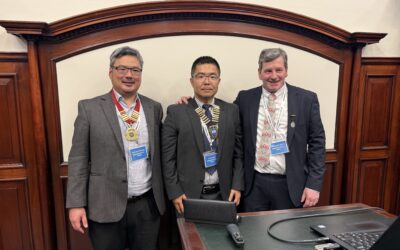The Branch had their summer event at Hatfield College Durham on 6 July, including a very interesting tour of Durham Castle with a wee bit of a history lesson!
Durham castle is the ancient palace of the Prince Bishops of Durham. It was built on the order of William the Conqueror on his return from Scotland in 1072 as a projection of the Norman kings power in the North of England. Strangely enough he thought we were a bit ‘wild’, no change there then! The tour took us around the two chapels, the Norman chapel built in 1078 & Tunstall’s chapel built in 1540 exclusively for the Prince Bishop. The last wish of the Prince Bishop in 1837 was to leave the castle and all surrounding land to form the University, which at the time was heavily challenged by London and the government, but they thankfully lost. To this date it it is still owned as used by Durham University and quite frankly is impressive. It is a fully functional home to students who use the grand ballroom for breakfast and dinner, and the upper floors are now student accommodation for the lucky ones.
The second part of the evening was taken up by a very informative and interesting look at “UK Energy Past, Present and Future” presented by Prof Jon Gluyas, who is currently Dean of Knowledge Exchange and Director of Energy Institute Durham University. The presentation covered the issues of the ENERGY TRILEMA which within the UK is seen as relating to Equity/Sustainability/Security. The origins of the petroleum age were described with three important landmark discoveries, Bibi – Aybat Caspian 1846, Spindletop – Texas 1901, and Masjed e Suleyman – Iran 1908. The use of Mineral Oil really took off in the 1860’s and led to reduction in use of Whale Oil therefore resulting in the reduction of whale Hunting! One of the most frightening statistics was that there have been no large Oil discoveries for over 50 years which has resulted in a decline in global reserves. The audience was taken through the issues of declining oil and gas prices and the resultant increase in consumption which again is putting major stresses on reserves. The increase in USA on Shale Gas is having little effect on the reserves which were steady from the 80’s but the gap is narrowing.
The presentation then turned to the situation in the UK showing the trend in energy production and consumption and again a widening energy gap was described through which we as a nation need to address from within the UK. Recent headlines show what is happening to our energy base, the last three deep coal mines are to close resulting in increased imports of coal for the remaining coal fired power stations, Ferrybridge power station to close, and oil & gas platform decommissioning accelerating in some cases 10 years early.
In the 1980’s the UK was self-sufficient in coal/gas/oil, but today is increasing our import of these. Most of our gas consumption is imported from Norway and Qatar, which is a real issue at the moment and we are talking about increasing imports. Most of Europe’s gas in controlled by Russia! Currently UK has 14 days of gas reserves whereas France & Germany have 100 days.
Finally the UK is cancelling many green energy policies making renewables more expensive as currently gas and oil are low in price. UK is considering following US lead and drawing upon fracking as an energy source as well as increasing reliance on nuclear. In summary these are interesting times in the energy industry and the UK needs to find ways of improving its self-sufficiency. One potential source is Geothermal which is estimated to be around 100 years worth of low carbon heating here in the UK, with potential centres in Cheshire, East Yorkshire and Wessex, to name a few. Utilisation of this technology could cut UK emissions by up to 38%.




